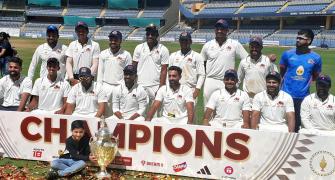The sixth accused in the Delhi gang-rape case, the one the Delhi Police claims raped a 23-year-old paramedical student in a moving bus on December 16 night twice, and is alleged to have inflicted such grievous injuries to girl that she died in a Singapore hospital 13 days later, is a juvenile, the Juvenile Justice Board in the capital had declared.
Understandably, the decision angered the family of the girl, and has incited strong comments. In the days following the outrage over the gang-rape, many student and young adults had protested on the streets across the country, holding banners demanding nothing less than capital punishment for the six accused. Many had wanted the accused castrated.
And now, the possibility that the most brutal offender of them all might get away with the lightest of punishment has made many anxious. After the decision of the JJB, there are now demands for amendments in the Juvenile Justice Act.
Minna Kabir, a noted child rights activist and the wife of Chief Justice of India Altamas Kabir, has been working at the legal aid cell at the Juvenile Justice Board for almost seven years now. She says that a chance visit to a girls’ home in Ranchi and the ‘bad state’ they were living in, in many ways, started her journey of working with juveniles.
She however does not agree that the age of a juvenile offender should be brought down to 16 years from 18 years.
“A lot of people have worked hard for the Juvenile Act. Our juvenile laws are robust enough,” she says, and cites that her counterparts in neighboring countries of Sri Lanka and Pakistan often marvel and say that the JJA in India covers immense ground.
Minna Kabir puts forward a compilation of statistics from both the Juvenile Justice Boards in the capital. A total number of 4906 enquiries (a trial is referred to as a enquiry, and a chargesheet is referred to a Police Interrogation Report in a Juvenile court) were undertaken from late-2007 till date. Of these, 266 juveniles were charged with rapes; of these 69 were acquitted and 18 were found to be adults; 3 were discharged.
Hence, there were 176 enquiries of rape out of the total 4,906, which amounts to 3.5 per cent of the total cases. Also, there are several instances of consensual sex, where the family of the girl charges the boy with rape, the counsels argue.
A juvenile offender in the capital is charged under the Delhi Juvenile Justice (Care and Protection of Children) Rules 2009. “There is a procedure (Rule 7 (a)) to claim juvenility before any court,” informs the defense counsel.
The rules state a juvenile offender is someone who is ‘alleged to have committed an offense and has not completed 18th year of age as on the date of the commission of such offence.’
The Delhi Juvenile Justice Rules rely on three documents to fix the age of an offender. It relies on:
a) The date of birth certificate from the school first attended, and if not available, it then asks for b) the birth certificate given by a corporation or a municipal authority or a panchayat.
In the absence of both these documents, the rules accept: c) the matriculation or equivalent certificates.
“It is only in cases where none of these documents are available, the JJB might agree to a bone ossification test,” says the defense counsel who declined to be named.
“The law is to protect the children in the street. Don’t you feel the rest deserve to have a chance,” Minna Kabir asks. “If somebody is picked for stealing or a petty crime, should that mean the end of their lives?” Kabir asks.
“And putting them away in jail, with hardened criminals who are adults, is no solution. Can you imagine what they will become when they get out of the jail?” she argues.
“Changing the law is not the way,” she says.
In the gang-rape case, the age of the accused was fixed based on the certificates at the first school he had attended, and hence the plea to hold a bone ossification test was consequently rejected, the defense counsel adds.
The counsel, a part of the legal aid services provided by the government of Delhi at the JJB at Delhi Gate, says they had cited a Supreme Court judgement of a case (Ashwani Kumar Saxena versus State of Madhya Pradesh) in 2011 to argue against conducting the bone ossification test.
While the public prosecutor’s office said they have not decided yet whether it will challenge the Board’s decision in the next plea, the legal aid cell is well-aware of the public interest in this case.
“If he is proven guilty, then he will be punished, but at least let the law take its course,” he says adding that it’s still a long way to go, as arguments begin and evidences are produced before the Board.
“If the juvenile is found to be guilty and given the maximum punishment, which in a juvenile court is three years, the juvenile offender would then be placed in a ‘special home’ for the entire duration, said the defense counsel.
Furthermore, even if the JJA is indeed amended, it cannot be applied to this case in retrospect, he adds.
“Please don’t try to change the JJA because of one case. The spirit of the act is for the children and the society,” the defense counsel says and argues that the decision to amend the rules won’t be fair to scores of others who deserve a second chance.
“We’ve had cases of juvenile delinquency, many of who have grown up to become doctors, MBAs and have taken government jobs,” says Advocate Bairaj, another counsel at the legal aid cell. “Is it fair to take away a second chance from all of them,” he asks.
A counsel at the legal aid cell at Kingsway Camp, home to JJB, observes that a majority of juvenile offenders are caught with charges of theft, robbery and very few for rapes and more heinous crimes. “Repeat offenders among juveniles are less than 5 per cent,” he says.
Anil Kumar Tiwary, another counsel says a majority of the offenders are 16-18 years old, and are often exposed to drugs by their peers. The counsels say that the identity of a juvenile offender is not revealed.





